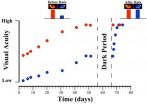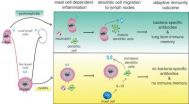(Press-News.org) Wednesday, February 13, 2013, Cleveland: Cleveland Clinic researchers have found that colorectal cancer outcomes could be improved with regular genetic screening for Lynch syndrome, the most common hereditary, adult-onset cause of colorectal cancer, as published in the online version of the Journal of Clinical Oncology.
Lynch syndrome is the most common genetic cause of colon cancer in adults. The study found that a universal screening program of all colorectal cancers surgically removed at Cleveland Clinic resulted in increased identification of Lynch syndrome patients by successfully referring individuals whose tumors screen positive to genetics professionals. Identification of Lynch syndrome will lead to significantly improved outcomes for colorectal cancer patients and their family members.
Most colorectal cancers are sporadic, and are not due to inherited genetic causes. More than 140 million Americans are diagnosed with colorectal cancer each year. With one out of 35 colorectal cancer cases resulting from Lynch syndrome, a hereditary condition that predisposes to a wide variety of cancers at earlier ages, a clinical recommendation was established in 2009 to screen all colorectal patients for Lynch syndrome. With four million Americans having Lynch syndrome each year, and most going unrecognized, a systematic manner of screening for this condition presented a challenge. Furthermore, another challenge is ensuring that all individuals whose tumors screen positive for potential Lynch syndrome are referred to genetics professionals.
By identifying Lynch syndrome patients, measures can be taken to thwart the development of additional cancers in the patient, as well as increase surveillance in the patient. Once Lynch syndrome has been identified in a patient, his/her family members can be referred to genetics professionals to determine if they too have inherited the same condition. As patients who carry the Lynch gene undergo proactive colon and other cancer screening for the earliest diagnoses, lives are saved.
The study recommends that a successful program should eliminate "silos" and instead include collaborative representation from colorectal surgery, gastroenterology, gynecology, pathology, genetics, as well as bioethics and oncology. The program must also designate who is to report results to patients and facilitate genetic counseling/testing referral. With clearly assigned roles for patient communication and education, outcomes resulting from Lynch syndrome will be significantly improved.
Led by Charis Eng, M.D., Ph.D., Hardis Chair and Founding Director of the Cleveland Clinic Lerner Research Institute's Genomic Medicine Institute, the researchers studied three approaches, moving certain responsibilities (determining which colorectal cancer patients should receive genetic counseling/testing for Lynch syndrome and contacting the patients with results and recommendations) from the surgeon to genetic counselors. Genetic counselors who received genetic pathology reports on colorectal tumor sections, determined patients who fit criteria consistent with Lynch syndrome, and reached out to patients for further testing saw an increase in referrals and number of patients tested for and diagnosed with Lynch syndrome, the study found.
The Cleveland Clinic researchers have addressed one of the two genomic medicine agenda items of the CDC's Healthy People 2020.
"One of the goals of Healthy People 2020 is to identify as many people who have inherited colon cancer as possible, so they may be referred to genetics professionals for genetic counseling, and management recommendations," said Dr. Eng. "This paper shows successful implementation of a rapid, cost-effective system-wide screening to detect potential Lynch syndrome. Individuals with Lynch syndrome can get colon cancer at a very young age, are susceptible to multiple cases of the disease, and are also predisposed to other cancers. Instituting high risk surveillance early and routinely saves lives and is an example of value-based delivery of healthcare."
The eight-year, collaborative study also highlighted a need to improve patient education regarding genetic counseling/testing. Perceived lack of benefit and underestimated risk of Lynch syndrome and associated cancers caused some patients not to pursue testing.
### Dr. Eng is also the founding Director of the Genomic Medicine Institute's clinical component, the Center for Personalized Genetic Healthcare. Dr. Eng's research interests may be broadly characterized as clinical cancer genetics translational research. For more information visit: http://www.lerner.ccf.org/gmi/eng/ Dr. Eng holds an American Cancer Society Clinical Research Professorship.
About Cleveland Clinic
Cleveland Clinic is a nonprofit multispecialty academic medical center that integrates clinical and hospital care with research and education. Located in Cleveland, Ohio, it was founded in 1921 by four renowned physicians with a vision of providing outstanding patient care based upon the principles of cooperation, compassion and innovation. Cleveland Clinic has pioneered many medical breakthroughs, including coronary artery bypass surgery and the first face transplant in the United States. U.S .News & World Report consistently names Cleveland Clinic as one of the nation's best hospitals in its annual "America's Best Hospitals" survey. About 2,800 full-time salaried physicians and researchers and 11,000 nurses represent 120 medical specialties and subspecialties. Cleveland Clinic Health System includes a main campus near downtown Cleveland, eight community hospitals and 18 Family Health Centers in Northeast Ohio, Cleveland Clinic Florida, the Lou Ruvo Center for Brain Health in Las Vegas, Cleveland Clinic Canada, and opening in 2013, Cleveland Clinic Abu Dhabi. In 2010, there were 4 million visits throughout the Cleveland Clinic health system and 167,000 hospital admissions. Patients came for treatment from every state and from more than 100 countries. Visit us at www.clevelandclinic.org. Follow us at www.twitter.com/ClevelandClinic.
Editor's Note: Cleveland Clinic News Service is available to provide broadcast-quality interviews and B-roll upon request.
Cleveland Clinic develops clinical screening program for no.1 genetic cause of colon cancer
8-year study addresses Lynch syndrome
2013-02-14
ELSE PRESS RELEASES FROM THIS DATE:
A little molecule's remarkable feat -- prolonging life
2013-02-14
NEW YORK, Feb. 14, 2013 – Nitric oxide, the versatile gas that helps increase blood flow, transmit nerve signals, and regulate immune function, appears to perform one more biological feat— prolonging the life of an organism and fortifying it against environmental stress, according to a new study.
The study reveals that a roundworm called Caenorhabditis elegans, an animal widely used in laboratory studies of aging, lives significantly longer when fed bacteria capable of manufacturing nitric oxide. The tantalizing observation points to one of the mechanisms by which the ...
Vision restored with total darkness
2013-02-14
Restoring vision might sometimes be as simple as turning out the lights. That's according to a study reported on February 14 in Current Biology, a Cell Press publication, in which researchers examined kittens with a visual impairment known as amblyopia before and after they spent 10 days in complete darkness.
Researchers Kevin Duffy and Donald Mitchell of Dalhousie University in Canada believe that exposure to darkness causes some parts of the visual system to revert to an early stage in development, when there is greater flexibility.
"There may be ways to increase ...
New study of the molecular roots of recurrent bladder infections could lead to a vaccine
2013-02-14
Urinary-tract infections are the second most common bacterial infection in humans, and many of them are recurrent. A study published by Cell Press on February 14th in the journal Immunity reveals the cellular and molecular basis of recurrent bladder infections and suggests possible treatment strategies, such as vaccines, to prevent this common problem.
"Our study shows for the first time that the bladder is unable to mount an effective immune response to bacteria, which could explain the high frequency of recurrent infections," says senior study author Soman Abraham ...
Roots of language in human and bird biology
2013-02-14
BOSTON, MA -- The genes activated for human speech are similar to the ones used by singing songbirds, new experiments suggest.
These results, which are not yet published, show that gene products produced for speech in the cortical and basal ganglia regions of the human brain correspond to similar molecules in the vocal communication areas of the brains of zebra finches and budgerigars. But these molecules aren't found in the brains of doves and quails -- vocal birds that do not learn their sounds.
"The results suggest that similar behavior and neural connectivity for ...
2 Cell studies reveal genetic variation driving human evolution
2013-02-14
VIDEO:
A pair of studies published by Cell Press on February 14th in the journal Cell sheds new light on genetic variation that may have played a key role in human...
Click here for more information.
A pair of studies published by Cell Press on February 14th in the journal Cell sheds new light on genetic variation that may have played a key role in human evolution. The study researchers used an animal model to study a gene variant that could have helped humans adapt to humid ...
Bilingual babies know their grammar by 7 months
2013-02-14
Babies as young as seven months can distinguish between, and begin to learn, two languages with vastly different grammatical structures, according to new research from the University of British Columbia and Université Paris Descartes.
Published today in the journal Nature Communications and presented at the 2013 Annual Meeting of the American Association for the Advancement of Science (AAAS) in Boston, the study shows that infants in bilingual environments use pitch and duration cues to discriminate between languages – such as English and Japanese – with opposite word ...
First animal model of recent human evolution
2013-02-14
The first animal model of recent human evolution reveals that a single mutation produced several traits common in East Asian peoples, from thicker hair to denser sweat glands, an international team of researchers reports.
The team, led by researchers from Harvard Medical School, Harvard University, the Broad Institute of MIT and Harvard, Massachusetts General Hospital, Fudan University and University College London, also modeled the spread of the gene mutation across Asia and North America, concluding that it most likely arose about 30,000 years ago in what is today ...
Defect in immune memory may cause repeat bladder infections
2013-02-14
DURHAM, N.C. – Recurrent bladder infections, which are especially common among women, may result from a defect among the bladder's immune fighters that keeps them from remembering previous bacterial infections. The immune memory lapse can hamper a timely and effective attack, according to researchers at Duke Medicine and Duke-National University of Singapore.
Their study, which involved mice, may provide a new route to develop vaccines and treatments for urinary tract infections, which are the second-most common infection and account for more than 8 million health care ...
Discovery in HIV may solve efficiency problems for gene therapy
2013-02-14
A research team from Case Western Reserve University School of Medicine has discovered an approach that could make gene therapy dramatically more effective for patients.
Led by professor Eric Arts, PhD, the scientists discovered that the process of gene therapy is missing essential elements thereby reducing the effectiveness of this treatment. Re-introducing this element into their model system suggests that improvements for gene therapy areon the horizon.
The findings are detailed in the article, "A new genomic RNA packaging element in retroviruses and the interplay ...
Study tracks leukemia's genetic evolution, may help predict disease course, tailor care
2013-02-14
BOSTON AND CAMBRIDGE, Mass.––Tumors are not factories for the mass production of identical cancer cells, but are, in reality, patchworks of cells with different patterns of gene mutations. In a new study, researchers at Dana-Farber Cancer Institute and the Broad Institute show, more fully than ever before, how these mutations shift and evolve over time in chronic lymphocytic leukemia (CLL) – providing a strobe-like look at the genetic past, present, and future of CLL tumors.
Their report, which will be published online today by the journal Cell, suggests that evolution ...
LAST 30 PRESS RELEASES:
ASU researchers to lead AAAS panel on water insecurity in the United States
ASU professor Anne Stone to present at AAAS Conference in Phoenix on ancient origins of modern disease
Proposals for exploring viruses and skin as the next experimental quantum frontiers share US$30,000 science award
ASU researchers showcase scalable tech solutions for older adults living alone with cognitive decline at AAAS 2026
Scientists identify smooth regional trends in fruit fly survival strategies
Antipathy toward snakes? Your parents likely talked you into that at an early age
Sylvester Cancer Tip Sheet for Feb. 2026
Online exposure to medical misinformation concentrated among older adults
Telehealth improves access to genetic services for adult survivors of childhood cancers
Outdated mortality benchmarks risk missing early signs of famine and delay recognizing mass starvation
Newly discovered bacterium converts carbon dioxide into chemicals using electricity
Flipping and reversing mini-proteins could improve disease treatment
Scientists reveal major hidden source of atmospheric nitrogen pollution in fragile lake basin
Biochar emerges as a powerful tool for soil carbon neutrality and climate mitigation
Tiny cell messengers show big promise for safer protein and gene delivery
AMS releases statement regarding the decision to rescind EPA’s 2009 Endangerment Finding
Parents’ alcohol and drug use influences their children’s consumption, research shows
Modular assembly of chiral nitrogen-bridged rings achieved by palladium-catalyzed diastereoselective and enantioselective cascade cyclization reactions
Promoting civic engagement
AMS Science Preview: Hurricane slowdown, school snow days
Deforestation in the Amazon raises the surface temperature by 3 °C during the dry season
Model more accurately maps the impact of frost on corn crops
How did humans develop sharp vision? Lab-grown retinas show likely answer
Sour grapes? Taste, experience of sour foods depends on individual consumer
At AAAS, professor Krystal Tsosie argues the future of science must be Indigenous-led
From the lab to the living room: Decoding Parkinson’s patients movements in the real world
Research advances in porous materials, as highlighted in the 2025 Nobel Prize in Chemistry
Sally C. Morton, executive vice president of ASU Knowledge Enterprise, presents a bold and practical framework for moving research from discovery to real-world impact
Biochemical parameters in patients with diabetic nephropathy versus individuals with diabetes alone, non-diabetic nephropathy, and healthy controls
Muscular strength and mortality in women ages 63 to 99
[Press-News.org] Cleveland Clinic develops clinical screening program for no.1 genetic cause of colon cancer8-year study addresses Lynch syndrome





